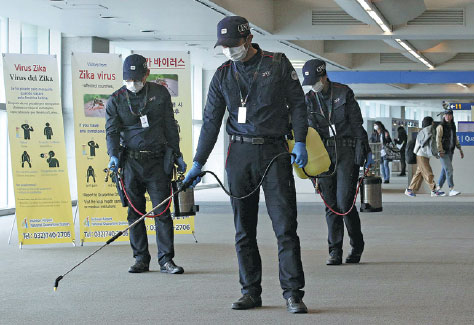Anxiety about epidemic emerges after first case of Zika virus in South Korea
By Agencies in Seoul (China Daily) Updated: 2016-03-23 08:28|
Workers from a disinfection service company sanitize the floor of Incheon International Airport in Incheon, South Korea, on Tuesday, to combat the Zika virus. Ha Sahyun / Reuters |
Anxiety about a Zika epidemic emerged in South Korea on Tuesday as the first case of the mosquito-borne disease was reported in a country still reeling from the trauma of an outbreak of Middle East Respiratory Syndrome last year.
A 43-year-old man who recently returned from Brazil was diagnosed with the virus after suffering fever, muscle pain and rash, according to a statement from the state-run Centers for Disease Control & Prevention.
The tropical disease, which has become epidemic in Latin America and the Caribbean, usually causes a mild illness. But the World Health Organization last month declared the explosive spread of Zika in the Americas to be a global emergency, due to its link to the spike in the number of babies born with abnormally small heads and the rise in a rare neurological syndrome that can cause paralysis and death.
The report triggered fears and raised anxieties among South Koreans who were traumatized by the MERS outbreak.
MERS had infected 186 South Koreans after it was first reported on May 20. Outside of the Middle East, South Korea became the country most affected by MERS, with a total of 36 deaths.
In online forums, one netizen said he was terrified upon hearing of the first Zika case in South Korea, as it can spread rapidly as seen in the MERS case last year. Another netizen said he could not believe the report of a Zika-stricken person in South Korea.
In South Korea's most-used search engine Naver, one netizen urged the South Korean government to take a strong initial response to the virus than it did last year to prevent the spread.
Some also expressed worry about the safety of South Korean athletes and spectators who will visit Brazil in August for the Olympic Games. They worried that the summer sports event may become a gate to South Korea's import of the Zika virus.
The virus has so far triggered outbreaks in more than 40 countries.







